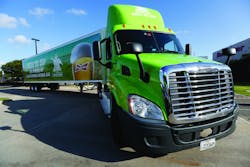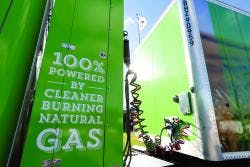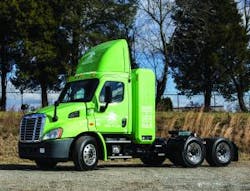Anheuser-Busch named Green Fleet of the Year by Fleet Owner, WIX Filters
Like any fine beer, it is a combination of ingredients that make a strong final product. Anheuser-Busch knows this better than anyone. With its stable of beers, including the iconic Budweiser, Bud Light, Michelob, Bass, Beck’s, and many more, the Busch family knows a thing or two about crafting a fine brew.
So, too, does the transportation department of the global titan. To run an efficient—and green—operation, it takes a multitude of steps, some small and some large, to get there. Anheuser-Busch still has a way to go to achieve its ultimate goals, but it is well on its way, and that is why Fleet Owner has chosen the company’s fleet as its Green Fleet of the Year.
Last fall, Anheuser-Busch announced it was converting its entire Houston fleet operation to run on compressed natural gas tractors. It was not a decision made lightly, and not one made in a vacuum.
Anheuser-Busch’s U.S. sustainability efforts extend from “Seed to Sip,” focusing on all areas of Anheuser-Busch’s operations from agriculture to its breweries and packaging to distributing its products. This includes growing barley with less water, recycling and reuse activities, and adding watersheds in all cities where the company’s breweries are located. These efforts have resulted in significant milestones, including a 32% reduction in water usage in the past five years.
The decision to go with natural gas tractors fits with the overall corporate sustainability approach. From a logistics standpoint, the company seeks to reduce carbon emissions by 15% (from network planning, transportation and warehousing) by the end of 2017.
“We would fit more into the ‘sip’ end of that [initiative] if you will,” says James Sembrot, senior director-transportation for Anheuser-Busch. “There are [plenty] of logistics-related activities to reduce that environmental impact. Within transportation, the move to compressed natural gas is one of those.”
In Houston, the fleet’s 66 tractors, expected to be fully deployed early in the second quarter of this year, are all being operated under a unique lease-driver arrangement between Anheuser-Busch, lease provider Ryder, and J.B. Hunt, which supplies drivers. J.B. Hunt had served as the brewer’s dedicated transportation provider in the Houston market. Conversely, Ryder similarly offers dedicated services with its own trucks and drivers, but this arrangement worked for Anheuser-Busch and all parties have climbed onboard.
CRAFTING SOLUTIONS
“To my knowledge, there are not many people who have this three-party arrangement,”Sembrot says. “It’s worked out well. The coordination of the different parties is probably more difficult, but the reason we did this was to move fast [to CNG].”
Sembrot says that differences had to be worked out when it came to spec’ing vehicles. Anheuser-Busch wants the vehicles as light as possible to maximize payload capacity. J.B. Hunt has its preferred specs, and Ryder has worked with natural gas vehicles for a number of years and has its preferences as well.
“The J.B. Hunt guys were very supportive moving forward,” Sembrot adds. “They knew they didn’t have the experience to operate a natural gas fleet of this size, [nor did] they have the maintenance facilities to maintain them. So we needed a third partner. It was really the equipment piece and bringing someone like Ryder on board that allowed us to go down this path.”
Ryder provides all maintenance under a full-service lease program it has with Anheuser-Busch. The lessor performs all maintenance at its Wallisville (Houston) shop.
“This combination of leasing the vehicles directly to [Anheuser-Busch] and having J.B. Hunt operate them is unique, but I don’t see that it is a compelling combination that is going to make the value proposition of natural gas any stronger,” says Scott Perry, vice president of supply management and global fuel products for Ryder. “It satisfied the needs of this specific operation.
“Ryder has its own dedicated offering, which includes vehicles, drivers, and management, and can couple that with a natural gas vehicle solution if there is a private fleet needing assistance in taking advantage of the value that can come from both, “ he continues. “The value levers are different for each product, and while they can be coupled together for even greater value from Ryder, they can operate efficiently on an exclusive basis as well.”
Anheuser-Busch has contracted with Questar Fueling, which operates a compressed natural gas fueling station about 3 mi. from Anheuser-Busch’s Houston facility, to supply the fuel.
The trucks in the Houston fleet are Freightliner Cascadia 113 tandem axle day cab models featuring a Cummins Westport ISX12 G engine, which is expected to emit 23% less greenhouse gas compared to a diesel engine. The trucks are equipped with 169 diesel gallon equivalent tanks and use the Quantum fuel system.
The Houston fleet shipped 17 million cases of beer in the third quarter alone and expects to reduce its carbon dioxide emissions by some 2,000 tons per year. The availability of state incentives helped make the Houston operation a great fit for the conversion, adds Sembrot.
CASE STUDY IN SUCCESS
A pilot test of two natural gas tractors earlier last year confirmed the decision was the right one. “We’ve been piloting two of these tractors since January doing trips to Dallas, slip-seating drivers to get as many miles on them as we could,” Sembrot told Fleet Owner back in October 2014, when the fleet was initially named a Fleet Owner Green Fleet of the Month. “It didn’t take long once we started testing these trucks to see that the technology was viable. And with the exception of a few maintenance [changes] … the drivers who are driving them said they have seen no difference [compared to diesel models] except for the fueling procedure.”
The Houston facility typically delivers product to wholesalers within a 250-mi. radius, allowing each of the vehicles to return home nightly. Sembrot adds that the tractors have had no problem pulling the heavier loads to wholesalers in 53-ft. trailers, which usually weigh out before cubing out.
Houston is the first full facility conversion for the company, but likely not the last. Sembrot says the company is exploring other facilities with St. Louis and Columbus, OH, next on deck. Conversions there could take place within the next two years.
Anheuser-Busch uses 13 dedicated fleet operations to haul its products. Those operations, split among three providers, transport about 35% of the company’s 750,000 loads of beer each year with a combined fleet of 570 tractors and 2,400 trailers. Anheuser-Busch operates 15 local breweries, 17 distributorships, and 23 agricultural and packaging facilities in the U.S.
Running a more efficient truck fleet is not the only approach Anheuser-Busch is taking to reduce its environmental impact. In its logistics operations, reducing package weight and miles are just two of the initiatives that are consistently looked at.
“We work very closely with the [fleets] on how you can reduce [vehicle] weight so we can maximize payload,” Sembrot says, adding that each facility has scales in place so drivers can weigh their vehicles before leaving to ensure compliance with all regulations. “We expect our providers to bring solutions to the table on a number of fronts—and environmental is just one front.”
The use of intermodal transport is also growing. This year, Sembrot says, 40,000 loads will be transported via intermodal. That is triple the amount shipped just three years ago.
“This is a mode of transportation that is both environmentally friendly and available,” he notes. “If you think about it, the coast-to-coast trucker is becoming [harder to find.] It’s a win-win for everyone. We get more cost-competitive rates and the carrier gets volume.”
J.B. Hunt is the company’s largest intermodal provider. Sembrot says that because intermodal providers also provide trucking services, revenue moving to rails is not necessarily money lost by the truckload operators.
CLOSE RELATIONSHIPS
For its part, Perry says Ryder has become quite comfortable developing this relationship with Anheuser-Busch, which holds a 46.4% market share in the U.S. beer market.
“The Anheuser-Busch organization has a very structured approach to how it implements new products and this doesn’t just apply to beer,” says Perry. “It uses this same discipline in looking at all of the different variables impacting its project plans and tries to make sure that every variable is addressed and all active members of the cross-functional team know what steps are being taken and why. This matches up very closely with how Ryder approaches a new customer relationship or implementation of a new product or service. We were very comfortable in the level of transparency that existed between our organizations and know that’s what long-term partnerships are made of.”
Perry adds that fleets like Anheuser-Busch are able to take advantage of full-service lease options as a way to quickly convert to an alternative fuel such as natural gas.
“We have leveraged the lessons learned over the past five years of operating natural gas vehicle technologies in our fleet, with now more than 30 million mi. of experience across multiple U.S. markets in our deployment with Anheuser-Busch,” he says. “Every customer application is unique and must be completely understood before taking the steps to introduce natural gas vehicles into any market.
“The application, range, weight, fuel type, available fueling infrastructure, and product being transported are all variables that have to be understood (both current and future state) in order to develop a solution that meets the fleet’s needs for today and tomorrow,” he continues. “We have developed a lot of experience in this space and will continue to integrate that growing experience base into our natural gas vehicle offering as we expand our own infrastructure, capabilities, and portfolio of services.”
That Ryder portfolio, along wih its partner in J.B. Hunt, has allowed Anheuser-Busch to move quickly to natural gas tractors. And with successes quickly building, it is setting a model upon which the brewer is able to measure future fits for natural gas throughout its supply chain.


